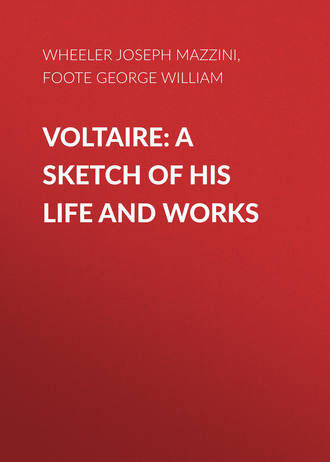
Voltaire: A Sketch of His Life and Works
Voltaire gives a peculiar reason for the non-appreciation by the English of Molière’s Tartuffe, the original of Mawworm if not of Uriah Heep. He says they are not pleased with the portrayal of characters they do not know. “One there hardly knows the name of devotee, but they know well that of honest man. One does not see there imbeciles who put their souls into others’ hands, nor those petty ambitious men who establish a despotic sway over women formerly wanton and always weak, and over men yet more weak and contemptible.” We fancy Voltaire must have seen society mainly as found among the Freethinkers. Could he give so favorable a verdict did he visit us now? The same remark applies to his statement that there was “no privilege of hunting in the grounds of a citizen, who, at the same time, is not permitted to fire a gun in his own field.” But this, as well as the more important passage that “no one is exempted from taxation for being a nobleman or priest,” was probably intended exclusively for the benefit of his compatriots. He was, however, not without a little touch of ridicule at the incongruities he detected in our countrymen. Thus he notes in one of his letters: “They learn Vanini and translate Lucretius for Monsieur le Dauphin to get by heart, and then, while they deride the polytheism of the ancients, they worship the Congregation of the Saints.”
Those educated in the current delusion that Voltaire was a mere mocker will be surprised to find the temperate way in which he speaks of the Quakers. Here, where there was such excellent opportunity for raillery, Voltaire shows he had a genuine admiration for their simplicity of life, the courage of their convictions, their freedom from priestcraft, and their distaste for warfare. In these Letters, as in all his writings, he proves how far he was the embodiment of the new era by his boldly expressed preference for industrial over military pursuits.
In his remarks on the Church of England, Voltaire, however, gives an unmistakable touch of his quality: “One cannot have public employment in England or Ireland, without being of the number of faithful Anglicans. This reason, which is an excellent proof, has converted so many Nonconformists that not a twentieth part of the nation is out of the pale of the dominant church.”
After alluding to the “holy zeal” of ministers against dissenters, and of the lower House of Convocation, who “from time to time burnt impious books, that is, books against themselves,” he says: “When they learn that, in France, young fellows noted only for debauchery and raised to the prelacy by female intrigue, openly pursue their amours, compose love-songs, give every day elaborate delicate suppers, then go to implore the illumination of the Holy Spirit, boldly calling themselves the successors of the Apostles – they thank God they are Protestants. But they are abominable heretics, to be burnt by all the devils, as Master François Rabelais says; and that is why I do not meddle with their affairs.”
The Presbyterians fare little better, for Voltaire relates that, when King Charles surrendered to the Scots, they made that unfortunate monarch undergo four sermons a day. To them it is owing that only genteel people play cards on Sunday: “the rest of the nation go either to church, to the tavern, or to see their mistresses.”
His admiration for English philosophy was startling to the French mind. Locke’s Essay became his philosophical gospel. “For thirty years,” he writes in 1768, “I have been persecuted by a crowd of fanatics because I said that Locke is the Hercules of Metaphysics, who has fixed the boundaries of the human mind.”
AT CIREY
A common admiration for Locke and Newton cemented his attachment to the Marquise du Châtelet, a lady distinguished from others of her age by her love of the sciences. With her Voltaire lived for over fifteen years at the Chateau of Cirey, in Campagne, “far from the madding crowd’s ignoble strife,” and, as Voltaire phrased it, “nine miles from a lemon.” Voltaire was at the outset forty and Madame twenty-seven, neither handsome nor well-formed, yet pleasing. She united learning with a zest for pleasure, and with the handsome fortune which Voltaire brought to the establishment was enabled to satisfy both tastes. Life at Cirey was varied by jaunts to Paris, Brussels and Sceaux, at which last place he wrote Zadig, one of his lightest and most characteristic burlesque stories.
Madame du Chàtelet has been much laughed at; but in the days when ladies take prizes in mathematics, that should be a thing of the past. Hard intellectual labor rather than the pursuit of pleasure characterised life at Cirey, or rather its inmates found their pleasure in their work. Madame would be translating Newton or studying Leibnitz. Her mathematical tutor worked at physical science in a gallery which had been built expressly for him. Voltaire would be aiding each in turn, or, ever faithful to his first love the drama, occupied with the writing or production of a tragedy or comedy for the theatre also attached to the premises. His production was as ever incessant. At the time of his first settlement there, Pope’s Essay on Man had been published. It suggested a Discourse on Man, in which he sought not to justify the ways of God to man, but to make man contented with his lot, not vainly inquiring into the why and wherefore of things. With Madame he wrote Elements of the Newtonian Philosophy, a work highly praised by Lord Brougham, who says: “The power of explaining an abstract subject in easy and accurate language, language not in any way beneath the dignity of science, though quite suited to the comprehension of uninformed persons, is unquestionably shown in a manner which only makes it a matter of regret that the singularly gifted author did not carry his torch into all the recesses of natural philosophy.” The French Government, despite the influence of aristocratic friends, refused to print a work opposed to the system of Descartes, and the volume had to be printed in Holland. For Madame, who despised the “old almanack” histories then current, in place of which Voltaire aimed at producing something more profitable to the readers, he wrote his Essay on the Manners and Spirit of Nations, in which for the first time in modern literature he applied philosophy to the teaching of history. He dissipated the dull dreams and deceits of the monks, and fixed attention on the real condition of things. With Voltaire, the commonest invention which improves the human lot is of more importance than battles and sieges. He gives importance to the physical and intellectual improvement of man. Brougham remarks that Voltaire’s Philosophy of History was written as a prelude to the Essay on the Spirit of Nations, but the whole work deserves that title. Buckle classes him with Bolingbroke and Montesquieu, the fathers of modern history, and all sceptics; and even now, says Lecky, no historian can read him without profit. Other contributions to history were the History of Charles XII., a masterpiece of vivid and vigorous narrative, and The Age of Louis XIV. It was here he wrote his too famous Pucelle, which he afterwards described as “piggery,” as well as some of the most famous of his plays, including. Ilzire, Zuline, L'Enfant Prodigue, Mahomet and Mérope, the best of his tragedies. With that impish spirit in which he ever delighted, he induced the Pope to accept the dedication of his play of Mahomet, and then laughed at his infallible Holiness for being unable to see that the shafts supposed to be directed at the impostor of Arabia were really aimed at fanaticism in another quarter.
To his first and last love, the French theatre, Voltaire contributed nearly sixty pieces, the majority of which are tragedies. Zaire and Mérope suffice to show the excellence he obtained in the classic drama. The first-named was written in three weeks, a wonderful tour de force. Olympic– written in old age – occupied but six days, though in this we must agree with the friend who told the author that he should not have rested on the seventh day. Voltaire’s plays indeed contain occasional fine passages, but they have not the rich delineation of character necessary for works of the first rank. It has been well remarked that in his dramas, as in history, he sought to portray not so much individuals as epochs. In Mahomet his subject is a great fanaticism; in Alzire, the conquest of America; in Brutus, the formation of the Roman power; in the Death of Cœsar, the rise of the empire or the ruin of that power. It is noteworthy that, despite his excess of comic talent, Voltaire preferred to devote his mind to tragedy rather than to comedy, in which one might have fancied he would have excelled. In truth, his desire to support the dignity of the stage stood in the way of his shining in comedy. Voltaire also at this period wrote a Life of Molière, in which he mingled criticism with biography.
Madame de Grafigny, who visited at Cirey, says he was so greedy of his time, so intent upon his work, that it was sometimes necessary to tear him from his desk for supper. “But when at table, he always has something to tell, very facetious, very odd, very droll, which would often not sound well except in his mouth, and which shows him still as he has painted himself for us —
Toujours un pied dans le cercueil,De l’autre faisant des gambades.”4“To be seated beside him at supper, how delightful!” she adds. Voltaire at Cirey was out of harm’s way, and could and did devote himself to his natural bent in literary work. Madame du Châtelet was sometimes “gey ill to live with.” but she preserved him from many annoyances and helped him somewhat at Court. Thanks to the Duc de Richelieu, his patron and debtor, he was appointed historiographer-royal in 1745, with a salary of two thousand livres attached, and in the following year was elected one of the Forty of the French Academy.
His life with Madame du Châtelet had shown him the possibility of woman being man’s intellectual companion. With what scorn does he make a lady, who claims equal rights in the matter of divorce with her husband, say:
“My husband replies that he is my head and my superior, that he is taller than me by more than an inch, that he is hairy as a bear, and that, consequently, I owe him everything and that he owes me nothing.” This was long before woman’s rights were thought of.
Voltaire and Frederick the Great.
While still at Cirey, Voltaire received many a flattering invitation from the Prince Royal of Prussia. Their correspondence, in the words of Carlyle, “sparkles notably with epistolary grace and vivacity,” though now mainly interesting as an illustration of two memorable characters and of their century. Voltaire helped him with his Anti-Machiavelli, remarking afterwards that had Machiavelli had a prince for a pupil, the very first thing he would have advised him to do would have been so to write. Frederick was bent on having the personal acquaintance and attendance of the renowned poet and philosopher. Much incense and mutual admiration passed, and at length, when he ascended the throne, Voltaire paid him several visits. On one occasion it was a diplomatic one, to cement a union between France and Prussia. Macaulay sneers at this “childish craving for political distinction,” and Frederick remarks that he brought no credentials with him. The correspondence and mutual admiration continued. Carlyle characteristically says: “Admiration sincere on both sides, most so on the Prince's, and extravagantly expressed on both sides, most so on Voltaire’s.” In one of his letters, Frederick says “there can be in nature but one God and one Voltaire.” If Voltaire was more extravagant than this, at least the paint was laid on more delicately. Frederick’s flattery, indeed, was not very carefully done. Thus, in writing to Voltaire he says: “You are like the white elephant for which the King of Persia and the Great Mogul make war; and the possession of which forms one of their titles. If you come here you will see at the head of mine, ‘Frederick by the Grace of God, King of Prussia, Elector of Brandenburg, Possessor of Voltaire, &c., &c.’” But the Marquise du Chàtelet considered that no King should displace a lady. She loved him; “jamais pour deux” she says; and perhaps, at the bottom of her heart, regretted the reputation which must have been ever a rival. At her death, Frederick renewed his invitation, expressing himself as now “one of your oldest friends,” and Voltaire, cut loose from his moorings, submitted to be tempted to the atmosphere of a court which he had before found little suited to a lover of truth, justice, and liberty.
The first of these visits, in September 1740, is thus satirically described by Voltaire: “I was conducted into his majesty’s apartment, in which I found nothing but four bare walls. By the light of a wax candle I perceived a small truckle bed, two feet and a half wide, in a closet, upon which lay a little man, wrapped up in a morning gown of blue cloth. It was his majesty, who lay sweating and shaking, beneath a beggarly coverlet, in a violent ague fit. I made my bow, and began my acquaintance by feeling his pulse, as if I had been his first physician. The fit left him, and he rose, dressed himself, and sat down to table with Algarotti, Keizerling, Maupertuis, the ambassador to the states-general, and myself; where, at supper, we treated most profoundly on the immortality of the soul, natural liberty, and the Androgynes of Plato.” Frederick says, in a letter to Jordan, dated September 24th: “I have at length seen Voltaire, whom I was so anxious to become acquainted with; but, alas! I saw him when I was under the influence of my fever, and when my mind and my body were equally languid. Now, with persons like him, one must not be ill; on the contrary, one must be very well, and even, if possible, in better health than usual. He has the eloquence of Cicero, the mildness of Pliny, and the wisdom of Agrippa: he unites, in a word, all that is desirable of the virtues and talents of three of the greatest men of antiquity. His intellect is always at work; and every drop of ink that falls from his pen, is transformed at once into wit. He declaimed to us Mahomet, an admirable tragedy he has composed, which transported us with delight: for myself, I could only admire in silence.”
The intercourse and disruption of the friendship between Voltaire and Frederick – “the two original men of their century,” as Carlyle calls them – has been inimitably told by that great writer whose temperament and training enabled him to do so much justice to the one and so little to the other. Voltaire must be excused for wishing to lead the King in the path of reason and enlightened toleration to peace. But the Court of Potsdam was in truth no place for him, and the Frenchmen not unnaturally regarded him as a deserter. Macaulay says: “We have no hesitation in saying that the poorest author of that time in London, sleeping in a hulk, dining in a cellar with a cravat of paper and a skewer for a shirt-pin, was a happier man than any of the literary inmates of Frederick’s Court.” Voltaire’s position was sure to excite jealousy, and his scathing wit was bound to get him in trouble. He could touch up the King’s French verses for a consideration, but could not be kept from laughing at his poetry. “I have here a bundle of the King’s dirty linen to bleach,” he said once, pointing to the MSS. sent to him for correction; and the bearers of course conveyed the sarcasm to his Majesty. On the other side Voltaire heard from Julien Offray de la Mettrie, author of Man a Machine, whom Voltaire called the most frank atheist in Europe, that the King had said: “I still want Voltaire for another year – one sucks the orange before throwing away the skin.” That orange-skin stuck in Voltaire’s throat, and when atheist La Mettrie died 11th November,
1751, from eating a pie supposed to be of pheasant but in reality of eagle and pork, Voltaire observes: “I should have liked to put to La Mettrie, in the article of death, fresh inquiries about the orange-skin. That fine soul, on the point of quitting the world, would not have dared to-lie. There is much reason to suppose that he spoke the truth.” Voltaire could neither submit to the domination of the Court coterie nor to that of their master. He offended Frederick, not so much by writing as by publishing his merciless ridicule of Maupertuis, the President of the Berlin Academy of Sciences – an institution suggested by Voltaire, who had indeed recommended Maupertuis as President – in his inimitable Diatribe of Doctor Akakia, Physician to the Pope, which Macaulay says, even at this time of day, it is not easy for any person who has the least perception of the ridiculous to read without laughing till he cries. But a public insult to the President of his Academy was an insult to the King, and the work was publicly burnt and Voltaire placed under arrest. But the matter blew over, though Voltaire sent back his cross and key of office, which the King returned. Voltaire wisely tried to rid himself of the intolerable constraint, and made ill-health the pretext of flight, going first to Plombières to take the waters. But he could not resist sending another shot at poor Maupertuis; and the King, perhaps considering he had forfeited claim to consideration, resolved to punish him. At Frankfort, nominally a free city but really dominated by a Prussian resident, he was arrested, together with his niece Madame Denis, and detained in an inn, even after he had given up his gold key as chamberlain, his cross and ribbon of the Order of Merit, and his copy of a privately printed volume of the royal rhymester’s poetry, for which he was ordered to be arrested. The volume was evidently the most important article in such mischievous hands, especially as it was said to contain satires on reigning potentates. Voltaire had left it at Leipsic, and had to wait, guarded by soldiers, till it arrived, and also till the King’s permission was accorded him to pass on to France. Voltaire relieved his rage by composing what he called Memoirs of the Life of M. de Voltaire, in which all the king’s faults and foibles, real and imaginary, as well as his literary pretensions, were unsparingly ridiculed. Frederick forgave Voltaire for having been ill-used by him, and some time after took the first step in reconciliation by sending him back the volume of poems. An amicable correspondence was renewed, though probably each felt they were better at a distance. Voltaire, even while he kept in his desk this libellous Life which perhaps he never, intended to publish, was generous and far-sighted enough to seek to make peace between Prussia and France at a time when Frederick was at the lowest ebb of his fortunes; while Frederick was great enough to permit the free circulation of the libel in Berlin. Morley says: “To have really contributed in the humblest degree, for instance, to a peace between Prussia and her enemies, in 1759, would have been an immeasurably greater performance for mankind than any given book which Voltaire could have written. And, what is still better worth observing, Voltaire’s books would not have been the powers they were but for this constant desire in him to come into the closest contact with the practical affairs of the world.” “What sovereign in Europe do you fear the most?” was once asked of Frederick, who frankly replied “Le roi Voltaire,” for here he knew was a potentate whose kingdom had no bounds, and who would transmit his influence to posterity. Frederick lived to pronounce a panegyric upon him before the Berlin Academy, in the year of his death. “The renown of Voltaire,” he predicted, “will grow from age to age, transmitting his name to immortality.”
“CANDIDE”
After this disastrous termination of court life Voltaire determined to try complete independence. Permission to establish himself in France being refused, he purchased an estate near Geneva. His residence here brought him into correspondence, at first amicable, with the most famous of her citizens, Jean Jacques Rousseau. There was a natural incompatibility of temper which speedily led to a quarrel. Both were sensitive, and Rousseau could not bear even kindly-meant banter. On Rousseau’s Social Contract Voltaire said it so convinced him of the beauty of man in a state of nature that, after reading it, he ran round me room on all fours. His reply to Rousseau’s rebuke for his pessimist poem on the earthquake of Lisbon was the immortal Candide, and Rousseau’s revenge was to say, slightingly, that he had not read it. When Rousseau thought fit to include Voltaire in the imaginary machinations against him, with which he absurdly changed Hume, Voltaire wrote to D’Alembert: “I have nothing to reproach myself with, save having thought and spoken too well of him.”
Voltaire at first seems to have been captivated by the doctrine of Pope’s Essay on Man. He, however, afterwards wrote: “Those who exclaim that all is well are charlatans. Shaftesbury, who first made the fable fashionable, was a very unhappy man. I have seen Bolingbroke a prey to vexation and rage, and Pope, whom he induced to put this sorry jest into verse, was as much to be pitied as any man I have ever known, misshapen in body, dissatisfied in mind, always ill, always a burden to himself, and harassed by a hundred enemies to his very last moment. Give me, at least, the names of some happy men who will tell me 'All is well.’” His optimism got injured during his journey through life, and was completely shattered by the earthquake at Lisbon in 1755. On this subject he produced a grave poem, notable for its confession of the difficult reconciling the evil of the world with the Beneficence of God? The same subject was dealt with in grotesque fashion in Candide, one of the wisest as well as one of the wittiest of works. A philosophy was never more triumphantly reasoned and ridiculed out of court than is optimism in Candide. Incident crowds on incident, argument jostles satire, illustration succeeds raillery, all to show the miseries of existence disprove this being the best of all possible worlds. At one moment we are forced to tears at contemplating the atrocities of inhumanity; the next we are forced to laugh at its absurdities. Prudes may be shocked at some incidents. Voltaire said he was not born to sing the praises of saints. He was himself no saint, but rather one of those sinners who had done the world more good than all its saints. But the influence of the work is profoundly good. It is purely humanitarian, War, persecution for religion, slavery, torture, and all forms of cruelty are made hateful by a recital of their facts; and all this is done in so charming, even flippant a manner, that we are laughing all the while we are most profoundly moved. Schopenhauer and Hartmann both enjoyed life, while Voltaire was an invalid most of his days; but they never threw into their pessimism the gaiety of Candide. And his peculiarity is, that he makes all man’s lower instincts ridiculous as well as detestable.
This character appears in all his work, but, as a fantastic tale, Candide stands alone. It brings out Voltaire’s most characteristic qualities: his keen eye for whimsicalities and weaknesses; his abhorrence of cruelty and iniquity in high places; his contempt for shams and absence of all veneration for the majesty of nonsensical custom. For mordant satire it is surpassed by Gulliver's Travels. But it is briefer; the touch is lighter, and instinct not with morose misanthropy, but hearty philanthropy. The characters are gross caricatures. Was there ever so preposterous an absurdity as Dr. Pangloss? And the incidents are improbable. Was ever so luckless a hero as Candide? What a succession of misfortunes! Candide travels the world in search of his lost beloved Cunégonde, meeting war, the Inquisition, torture, shipwreck, piracy, and slavery, with all their attendant horrors. Even the earthquake of Lisbon is brought in; yet with whimsical pertinacity, Pangloss clings to his flimsy philosophy.
When he re-meets Candide, who had left his tutor as dead, he thus relates his adventures: “But,” my dear Pangloss, “how happens it that I see you again?” said Candide. “It is true,” answered Pangloss, “you saw me hanged; I ought properly to have been burnt; but, you remember, it rained in torrents when they were going to roast me. The storm was so violent they despaired of kindling the fire; so I was hanged, because they could do no better. A surgeon bought my body, carried it home, and dissected me. He made first a crucial incision from the navel to the neck. One could not have been more badly hanged than I. The executioner of the Holy Inquisition was a sub-deacon, and truly burnt people capitally, but, as for hanging, he was a novice; the cord was wet, and not slipping properly, the noose did not join – in short, I still continued to breathe. The crucial incision made me shriek so that my surgeon fell back, and, imagining it was the devil he was dissecting, ran away in mortal fear, tumbling downstairs in his fright. His wife, hearing the noise, flew from the next room, and saw me stretched upon the table with my crucial incision. Still more terrified than her husband, she ran down also, and fell upon him. When they had a little recovered themselves, I heard her say to the surgeon, ‘My dear, how could you think of dissecting a heretic? Don’t you know that the devil is always in them? I’ll run directly to a priest, to come and exorcise the evil spirit.’ I trembled from head to foot at hearing her talk in this manner, and exerted what little strength I had left to cry out, ‘Have pity on me!’ At length, the Portuguese barber took courage, sewed up my wound, and his wife even nursed me. I was upon my legs in about a fortnight. The barber got me a place as lacquey to a Knight of Malta, who was going to Venice; but finding my master had no money to pay me my wages, I entered into the service of a Venetian merchant, and went with him to Constantinople. One day I took the fancy to enter a mosque, where I saw no one but an old Iman and a very pretty young female devotee, who was saying her prayers. Her neck was quite bare, and in her bosom she had a fine nosegay of tulips, roses, anemones, ranunculuses, hyacinths, and auriculas. She let fall her bouquet. I ran to take it up, and presented it to her with a bow. I was so long in replacing it, that the Iman began to be angry, and, perceiving I was a Christian, he cried out for help. They took me before the Cadi, who ordered me to receive one hundred bastinadoes, and sent me to the galleys. We were continually whipt, and received twenty lashes a day, when the concatenation of sublunary events brought you on board our galley to ransom us from slavery.”









